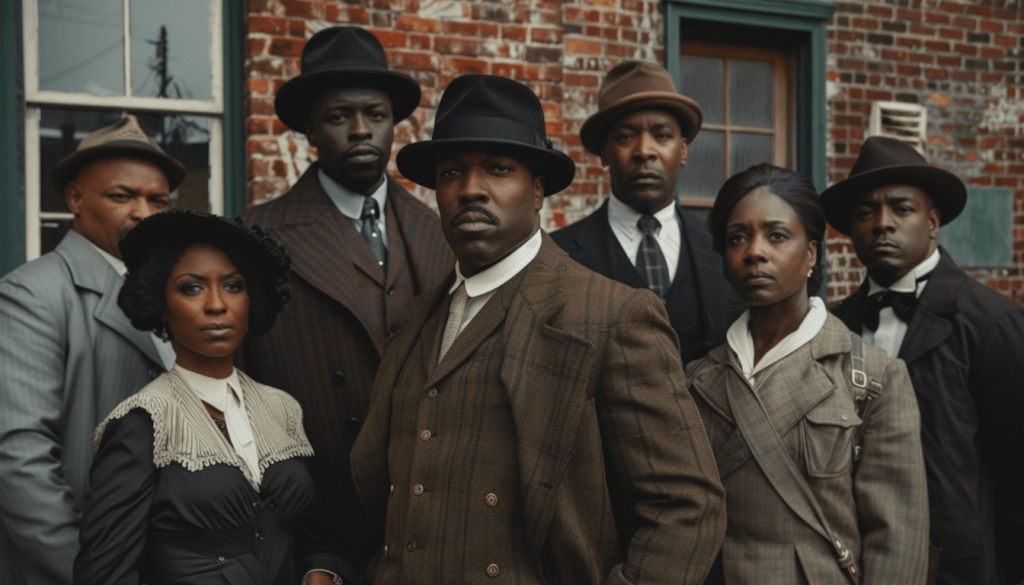J.B. Stradford, Black Wall Street founder and architect of Greenwood’s economic legacy, was a pioneering entrepreneur, visionary leader, and staunch advocate for Black independence. Born into freedom but surrounded by the vestiges of systemic racism, Stradford’s journey exemplifies resilience, determination, and the transformative power of collective progress. His contributions laid the foundation for one of the most successful Black communities in American history—Greenwood’s Black Wall Street.
This article delves into Stradford’s remarkable life, his pivotal role in Greenwood’s prosperity, and the lasting lessons his legacy imparts to modern efforts toward equity and empowerment.
To explore the broader network of Greenwood’s founders and visionaries, visit our anchor article Founders and Visionaries of Black Wall Street.Stradford’s Early Life and Legal Education
Born into freedom in Bardstown, Kentucky, in 1861, J.B. Stradford experienced both the lingering effects of slavery and the transformative possibilities of emancipation.

His father, Caesar Stradford, had been enslaved but secured his freedom before the Civil War, later becoming a successful horse breeder. This legacy of perseverance and achievement profoundly shaped J.B.’s worldview, instilling in him a deep commitment to self-reliance and economic empowerment.
J.B. Stradford’s academic journey was remarkable for its time. He attended Oberlin College, an institution known for its progressive stance on racial equality, before earning a law degree from Indiana University. At a time when educational opportunities for African Americans were severely limited, Stradford’s pursuit of higher education reflected his determination to equip himself with the tools to challenge systemic inequities.
Stradford’s legal training not only provided him with a professional skillset but also shaped his approach to entrepreneurship and community leadership. He understood the importance of using legal and economic frameworks to build collective power, a philosophy that would guide his future endeavors in Greenwood.
Stradford’s legal activism was rooted in a belief that Black prosperity must be protected by law. For historical context on Black legal resistance during the Jim Crow era, see the NAACP Legal Defense Fund’s history of civil rights litigation.
J.B. Stradford: Black Wall Street Founder and Greenwood Economic Legacy
In 1899, J.B. Stradford moved to Tulsa, Oklahoma, bringing with him a vision to create a thriving Black economic enclave in Greenwood.

His foresight and dedication transformed the district into a hub of opportunity and prosperity, despite the systemic constraints of segregation. Stradford understood that economic independence was the key to empowering the African American community, and he worked tirelessly to build the foundations of a self-reliant economy.
His foresight and dedication, alongside fellow pioneer O.W. Gurley, transformed the district into a hub of opportunity and prosperity.Key Contributions:
- Pioneering Real Estate Development: Stradford’s strategic investments in Greenwood’s real estate were instrumental in the district’s growth. He purchased and developed properties to provide both affordable housing and commercial spaces for Black residents, creating a supportive environment for small businesses to thrive. His efforts not only attracted entrepreneurs but also laid the groundwork for a robust local economy.
- The Stradford Hotel: Opened in 1918, the Stradford Hotel was more than just a luxury establishment; it was a symbol of pride and progress. As one of the largest Black-owned hotels in the United States, it offered a dignified space for Black travelers during an era of widespread segregation. The hotel’s success inspired other entrepreneurs in Greenwood, reinforcing the district’s reputation as a beacon of Black excellence.
- Advocating for Community Empowerment: Stradford was not only a businessman but also a leader who believed in the power of collective progress. He encouraged Greenwood’s residents to invest in their community and supported educational initiatives that prepared the next generation for leadership. His advocacy extended beyond economic matters, addressing civil rights and the broader struggle for equality.
Stradford’s vision and efforts established Greenwood as a thriving Black Wall Street. His work exemplifies how strategic investments and a commitment to community empowerment can create lasting economic and social impact.
His entrepreneurial legacy echoes through generations. For a comparative look at Black business development across eras, visit Building Black-Owned Businesses: Then and Now.
Building Greenwood’s Black Wall Street
J.B. Stradford didn’t just invest in property—he invested in possibility. Arriving in Tulsa with a law degree and a vision, Stradford saw Greenwood not as a neighborhood, but as a blueprint for Black economic independence. He built the Stradford Hotel, one of the largest Black-owned hotels in the country at the time, offering not just lodging but dignity in a segregated landscape.
Stradford’s influence extended beyond real estate. He advocated for self-sufficiency, encouraging Black residents to own businesses, build institutions, and circulate wealth within the community. His legal background gave him the tools to challenge discriminatory practices, while his entrepreneurial spirit helped shape Greenwood into a thriving district of barbershops, theaters, grocery stores, and professional offices—all Black-owned, all community-powered.
Alongside fellow visionary O.W. Gurley, Stradford helped establish Greenwood as a national symbol of Black excellence. Their combined efforts laid the foundation for what would become known as Black Wall Street—a place where ambition met infrastructure, and where prosperity was not just possible, but palpable.
The Tulsa Massacre and Stradford’s Exile
Despite Greenwood’s extraordinary prosperity, it was not immune to the rising tide of racial tensions in early 20th-century Tulsa.

These tensions, fueled by systemic racism, economic envy, and white supremacist ideologies, culminated in the 1921 Tulsa Race Massacre—one of the most devastating acts of racial violence in American history.
During the massacre, white mobs descended upon Greenwood, looting and burning homes, businesses, and institutions. The Stradford Hotel, a symbol of Black achievement and pride, was among the many establishments reduced to ashes. The attack displaced thousands of residents and obliterated decades of progress in a matter of hours.
J.B. Stradford’s Ordeal:
- Falsely accused of inciting violence during the massacre, Stradford faced indictment and threats to his life. To escape persecution, he fled Tulsa and relocated to Chicago.
- Despite these hardships, Stradford continued his advocacy for racial justice, using his legal expertise and influence to support the broader struggle for civil rights.
The Aftermath and Ongoing Impact:
- Greenwood’s destruction was a catastrophic loss, both economically and emotionally, for its residents. Many survivors faced significant challenges in rebuilding their lives without adequate support or reparations.
- Stradford’s name was eventually cleared decades later, recognizing him as a victim of systemic racism rather than a perpetrator of violence. This posthumous vindication underscored the injustice he endured and highlighted the resilience of his legacy.
The massacre’s impact extended far beyond Tulsa, serving as a grim reminder of the systemic barriers Black communities faced in their pursuit of economic independence. However, Greenwood’s spirit—embodied by leaders like J.B. Stradford—remains a powerful symbol of resilience and the ongoing fight for justice and equity.
His legal activism laid groundwork for future calls for justice and accountability. For a federal perspective on historical redress, see Justice Department’s Report on the Tulsa Race Massacre.
Greenwood’s Economic Legacy: Lessons from J.B. Stradford
J.B. Stradford’s legacy is a profound reminder of the transformative power of vision and determination. His contributions to Greenwood illustrate how economic independence and collective effort can empower communities to thrive, even in the face of systemic oppression. Stradford’s story serves as both a blueprint for economic success and a rallying cry for justice and equity.

Enduring Lessons:
- The Importance of Ownership: Stradford’s real estate investments and development projects highlighted ownership as a cornerstone of wealth and stability. By fostering opportunities for others to own property and businesses, he demonstrated how ownership builds both individual and communal strength.
- Leadership Rooted in Community: Stradford’s leadership extended beyond his business ventures. He understood that true progress comes from uplifting the entire community. His initiatives to encourage investment, education, and mutual support serve as timeless examples of community-centered leadership.
- Resilience Against Adversity: Stradford’s ability to persevere and continue advocating for justice despite personal and communal loss is a testament to his resilience. His unwavering commitment to racial equity underscores the importance of persistence in the fight for justice.
Stradford’s life and work continue to inspire modern efforts to address systemic inequalities and build economic empowerment. His vision for Greenwood’s Black Wall Street offers enduring lessons on the power of entrepreneurship, collaboration, and leadership in creating a more equitable future.
His legacy lives on in survivor accounts and community memory. Explore firsthand narratives in Personal Stories from the Survivors of Black Wall Street.
Final Thoughts: Stradford’s Legacy and the Future of Black Economic Empowerment
J.B. Stradford’s vision for Black Wall Street transcends his era, offering timeless lessons on the importance of economic empowerment, resilience, and community leadership. His unwavering belief in self-reliance and ownership underscores the transformative potential of collective effort in overcoming systemic barriers.
Stradford’s story reminds us that true progress is rooted in both individual initiative and collective empowerment. By learning from his example and addressing contemporary challenges, we can continue the work of building inclusive, equitable communities where all individuals have the opportunity to thrive.
Honoring J.B. Stradford’s legacy means embracing his principles of entrepreneurship, collaboration, and advocacy for justice. To further explore Stradford’s impact and the history of Greenwood, resources such as The Tulsa Historical Society and Museum and The Greenwood Cultural Center provide invaluable insights.
Through these efforts and a commitment to his ideals, we not only celebrate the history of Black Wall Street but also create a pathway to a more just and equitable future for generations to come.
Related Articles
- Founders and Visionaries of Black Wall Street – Profiles of Greenwood’s architects of prosperity.
- O.W. Gurley: A Founder of Prosperity – Gurley’s land investments and civic planning legacy.
- Building Black-Owned Businesses: Then and Now – Entrepreneurial resilience across generations.
- Personal Stories from the Survivors of Black Wall Street – Firsthand accounts of survival and rebuilding.
- Justice Department’s Report on the Tulsa Race Massacre – Federal reflections on historical accountability.
Historical Resources and Archival References
-
NAACP Legal Defense Fund – History
A timeline of legal advocacy and civil rights milestones, echoing the legacy of attorneys like J.B. Stradford and B.C. Franklin. -
Tulsa Historical Society and Museum
Archival records, survivor testimonies, and curated exhibits documenting the rise, destruction, and rebuilding of Greenwood and Black Wall Street. -
Greenwood Cultural Center
A living memorial and educational hub preserving the legacy of Greenwood’s founders, entrepreneurs, and survivors.
